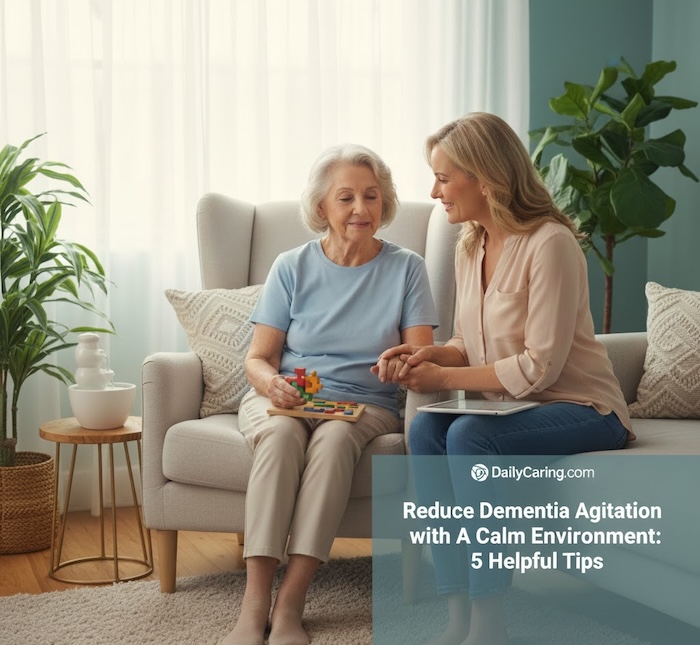When a loved one with dementia insists they’re perfectly fine, despite forgetting names, missing appointments, or struggling with daily tasks, families often ask: Are dementia patients aware of their condition?
The short answer? Oftentimes, no. Many people with dementia or Alzheimer’s are unaware of their condition due to a neurological phenomenon called anosognosia. Let’s explore why this happens and its impact on caregiving.

Does Someone With Dementia Know They Have It?
Cognitive decline can affect memory and/or reasoning and can rob a person of the ability to recognize their own impairments. This is common in:
- Alzheimer’s disease
- Vascular dementia (after strokes)
- Brain injuries or tumors
Unlike simple denial, where a person consciously avoids the truth, anosognosia (meaning “to not know a disease”) stems from physical brain damage. The regions responsible for self-awareness, particularly the frontal lobes and right hemisphere, may no longer function properly. As a result, the person genuinely believes nothing is wrong.
One interesting anecdote that many people can relate to is the aging adult who has no idea how impaired their driving is until a crisis occurs (usually an accident). People with cognitive decline are unable to recognize warning signs as they occur in real time.
“Dementia is the only disease where the sicker the person gets, the less they know it.” — Dr. Peter Rabins, co-author of The 36-Hour Day.
What is Anosognosia and How is it Relevant?
Anosognosia is a condition that causes someone to be unaware of their mental health condition and how it affects them. It’s common in some situations, including dementia.
So, someone who has been diagnosed with dementia, but has anosognosia, doesn’t know or believe that they have dementia.
Anosognosia symptoms may vary from person to person, change over time, and even change within a day. The person might sometimes understand what’s happening and, at other times, firmly believe that they’re completely fine.
And other people might only be partially aware that there’s something wrong.
VIDEO: Are Dementia Patients Aware of Their Condition?
Anosognosia vs. Denial: What’s the Difference?
When someone is in denial, they're aware of a fact, but refuse to accept it. Someone who has anosognosia in dementia isn’t in denial – it’s something different.
With anosognosia, the dementia has caused damage in the brain that makes it impossible for that person to be aware of what’s happening to them. Here are some examples:
Denial: The person recognizes a problem but refuses to admit it. (They may be refusing to accept a diagnosis out of fear.)
Anosognosia: The brain cannot process the impairment. They’re not “in denial” but neurologically incapable of understanding what's happening to them.
Example:
A person with dementia may insist they still drive safely, despite having been involved in multiple accidents. If he were in denial, he might say, “I know my memory’s bad, but I've been driving for years. I’m fine behind the wheel!” A person with anosognosia would firmly believe, “There’s nothing wrong with my driving at all.”

Anosognosia Symptoms
Unawareness of cognitive impairment may involve memory, general mental abilities, emotions, or physical abilities.
The person might have trouble with language, like finding words, but they’re likely to explain these situations with excuses about forgetfulness or tiredness.
If they forget to bathe, miss appointments, or burn food on the stove, they’re still likely to make excuses and insist they don’t need help.
They’ll probably also insist that they can live independently and care for themselves, despite clear evidence that things are not OK.
Someone with anosognosia might get angry and defensive if someone reminds them about their cognitive impairment because, in their mind, they’re convinced that there’s no problem.
How Anosognosia Shows Up in Dementia
Awareness can fluctuate:
Early stages: Some individuals experience moments of clarity, noticing memory lapses that may cause distress.
Later stages: Anosognosia will typically worsen as brain damage progresses.
Common signs:
- Making excuses for mistakes (“Oh, I’m just tired!”)
- Resisting help with tasks they can't manage anymore (like bathing or dressing themselves completely)
- Anger, confusion, or defensiveness when confronted about memory lapses (“You’re exaggerating, I can dress myself perfectly fine!”)

Why Anosognosia Matters for Caregivers, and How to Respond
Anosognosia isn’t just confusing; it can create safety risks and a strain on your relationship with your patient or loved one. Families often feel hurt when a loved one dismisses their concerns or refuses help with any given task.
How to respond:
- Avoid arguments: Correcting them (“You have dementia!”) will only frustrate both of you, and, depending on the situation, this kind of behavior could escalate into a more significant issue to address later.
- Redirect gently: Instead of, “You can’t cook alone,” try, “Let’s make dinner together. I’d love your help!”
- Focus on safety: Adapt to their environment (disable stoves, use GPS trackers, purchase some adaptive clothing for seniors) rather than relying on their judgment.
“Meet them in their reality. Arguing with dementia is like fighting the tide—you’ll only exhaust yourself.” — Teepa Snow, dementia care expert.
A Note on Compassion When it Comes to Dementia
It’s heartbreaking to watch a loved one lose their self-awareness. However, remember that anosognosia is a symptom, not stubbornness. Meeting people with dementia where they are, with patience, creativity, and compassion, can ease tensions and improve their quality of life.
If you’re struggling with this issue, reach out to resources like the Alzheimer’s Association or a caregiver support group. You’re not alone in this journey!

Frequently Asked Questions:
1. Can a Person with Dementia Ever be Aware of Their Condition?
Yes, especially in the early stages of the disease. Some people may notice memory lapses or confusion and feel distressed. However, as dementia progresses (and particularly in Alzheimer’s disease), anosognosia often makes it harder for them to recognize their symptoms. Awareness can and will fluctuate.
2. How Should I Talk to a Loved One Who Denies Dementia?
Avoid confrontations! Instead of correcting them (“You have Alzheimer’s, you can’t drive!”), Focus on reassurance and redirection:
- Validate their feelings: “I'm sorry, I know this is frustrating.”
- Offer help and understanding: “Let’s check the directions together. I get confused sometimes as well.”
- Blame the issue, not the person: “This stove is tricky! How about we order dinner out tonight?”
3. Is Anosognosia Treatable?
There’s no cure, but these strategies may help manage its impact:
- Medical approaches: Some medications (like cholinesterase inhibitors) may slow cognitive decline slightly, but they won’t restore awareness.
- Behavioral techniques, such as occupational therapy and other routines, may help reduce safety risks.
- Caregiver education: Learning to work with anosognosia, not against it, can ease the stress for everyone.
Did we miss anything? We love to hear from our caregiver advocates. Leave us a comment below – Sharing is caring!
Recommended for you:
- Therapeutic Fibbing: Why Experts Recommend Lying to Someone With Dementia
- 3 Stages of Dementia: What to Expect as the Disease Progresses
- 9 Best Alzheimer’s and Dementia Books for Caregivers
About the Author

Connie is the founder of DailyCaring.com and was a hands-on caregiver for her grandmother for 20 years. (Grandma made it to 101 years old!) She knows how challenging, overwhelming, and all-consuming caring for an older adult can be. She also understands the importance of support, especially in the form of practical solutions, valuable resources, and self-care tips.













